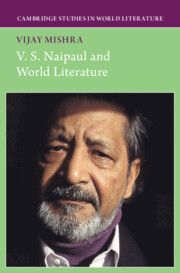Book contents
- V. S. Naipaul and World Literature
- Cambridge Studies in World Literature
- V. S. Naipaul and World Literature
- Copyright page
- Dedication
- Contents
- Figures
- Acknowledgments
- Prologue
- Introduction
- Chapter 1 V. S. Naipaul Aesthetic Ideology and World Literature
- Chapter 2 “The English Language Was Mine; The Tradition Was Not”
- Chapter 3 The Indenture Social Imaginary
- Chapter 4 Empires, Slaves, Rebels, and Revolutions
- Chapter 5 In the Shadow of the Master
- Chapter 6 The Travel Book and Wounded Civilizations
- Epilogue
- Notes
- Works Cited and Select Bibliography
- Index
Chapter 3 - The Indenture Social Imaginary
A House for Mr Biswas and After
Published online by Cambridge University Press: 01 February 2024
- V. S. Naipaul and World Literature
- Cambridge Studies in World Literature
- V. S. Naipaul and World Literature
- Copyright page
- Dedication
- Contents
- Figures
- Acknowledgments
- Prologue
- Introduction
- Chapter 1 V. S. Naipaul Aesthetic Ideology and World Literature
- Chapter 2 “The English Language Was Mine; The Tradition Was Not”
- Chapter 3 The Indenture Social Imaginary
- Chapter 4 Empires, Slaves, Rebels, and Revolutions
- Chapter 5 In the Shadow of the Master
- Chapter 6 The Travel Book and Wounded Civilizations
- Epilogue
- Notes
- Works Cited and Select Bibliography
- Index
Summary
Chapter 3 begins with a reading of A House for Mr Biswas (1961), a work that marks an epistemic shift in Naipaul’s thinking. The novel does for the plantation diaspora what Balzac did for France. After a careful reading of this triumphal novel, the chapter shows Naipaul’s fascination with modernist compositional features in his much-neglected Mr Stone and the Knights Companion (1963). Then, suddenly uncompleted mourning creeps in. The product of that deepening melancholic imagination is his “placid” and poetic The Mimic Men (1967). It is a compulsion towards aesthetic design, to qualities by which a work of art is judged, that take him to a very personal engagement with Englishness where Naipaul takes on the challenging discourse of Romanticism (a poetic register co-existing with the high point of British imperialism). In Wordsworth there is the memorable account of the poet meeting a leech gatherer; in The Enigma of Arrival Naipaul encounters his own version of the leech gatherer even as he begins to understand that “Englishness” was always a learning process for both the colonial and the colonized.
Keywords
- Type
- Chapter
- Information
- V. S. Naipaul and World Literature , pp. 58 - 97Publisher: Cambridge University PressPrint publication year: 2024

